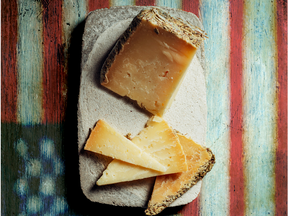But ruling may also mean home-grown dairy brands face more American competitors
Article content
A wider world of American cheese could soon be available in Canadian dairy aisles following the federal government’s defeat this week in a high-profile trade dispute, according to the International Cheese Council of Canada, an Ottawa-based body of importers.
Advertisement
This advertisement has not loaded yet, but your article continues below.
Article content
The trickle of U.S. cheese crossing the border has historically consisted of mostly industrial-sized chunks that get sliced or grated and packaged as domestic brands, or used in frozen pizzas, the cheese council said. Meanwhile the high-end stuff, the artisanal, terroir-specific varieties, are mostly shut out, including American blues and Asiago from a vibrant scene in Wisconsin. Not to mention, “Vermont is heavily into goat cheeses,” said Joe Dal Ferro, an industry veteran who serves as the council’s vice-chair. “There’s a wide variety of products that Canadians currently don’t have access to.”
This week’s ruling by an international dispute resolution panel — the first of its kind under the United States-Mexico-Canada Agreement (USMCA) — could change things, Dal Ferro said. But not all in the industry are as optimistic, with some manufacturing advocates warning that home-grown dairy brands could be up against more American competitors.
Advertisement
This advertisement has not loaded yet, but your article continues below.
Article content
Under USMCA, Canada committed to loosening its system of supply management that protects domestic producers by controlling production, setting prices and imposing high tariffs on imports coming into the market. Specifically, the federal government agreed to expand the volume of U.S. dairy imports allowed to enter without prohibitive tariffs — known as a tariff-rate quota (TRQ) — including 12,500 metric tons of cheese by the sixth year of the agreement.
U.S. dairy farmers and exporters saw that extra quota as a victory, at least at first. But then Canada allocated the majority of the quota — 85 to 100 per cent — to its domestic processors. American producers and exporters complained they were being short-changed by Canadian processors, who were more inclined to import bulk product and turn it into higher-value goods, rather than import more expensive, retail-ready products straight from the U.S.
Advertisement
This advertisement has not loaded yet, but your article continues below.
Article content
In the cheese industry, the quota allocation system has resulted in Canada mostly bringing in large blocks from Michigan and other “high-volume states,” rather than artisanal producers in Wisconsin, California or Vermont, Dal Ferro said. Giving more quota to distributers and importers would increase competition and give “Canadian consumers better pricing opportunities and more variety,” he said.
The U.S. called for a dispute resolution panel to look into the issue, resulting in a hearing last year. On Tuesday, that panel released a ruling that found Canada’s system of allocating quota was in violation of the treaty.
The U.S. has it right on this and the Canadian government had it wrong
Retail Council of Canada spokesperson Michelle Wasylyshen
U.S. Trade Representative Katherine Tai called it a “historic win,” while Canada’s trade minister, Mary Ng, applauded the panel for recognizing that Canada still has the discretion to decide who gets quota.
Advertisement
This advertisement has not loaded yet, but your article continues below.
Article content
Ottawa has until next month to come up with a new system, and it’s still unclear how that will redistribute the imports to retailers or distributors.
“They now have a better shot at getting quota. But it’s by no means clear how much they’re actually going to get,” said Nicolas Lamp, a former dispute settlement lawyer at the World Trade Organization who now teaches trade law at Queen’s University. “It’s really important to understand how limited this ruling is … No one is telling Canada, ‘This is exactly how you have to allocate the quota.’”
Advertisement
This advertisement has not loaded yet, but your article continues below.
Article content
The new mechanism could be anything from a lottery or auction, to a first-come-first-served system, Lamp suggested.
“The challenge for the Canadian government will be to design a system that still achieves its policy objectives, which is to give the vast majority of the quota to processors, while counting as fair and equitable under the USMCA,” he said. “If you import finished products … most of the value creation is going to happen in the United States.”
The Retail Council of Canada (RCC), which represents the largest grocery chains in Canada, argued just allowing processors to import U.S. dairy creates an “unnecessary” layer to the supply chain, resulting in added cost.
“The U.S. has it right on this and the Canadian government had it wrong,” RCC spokesperson Michelle Wasylyshen said in an email on Thursday. “If you want to see some of the benefits of free-trade agreements in the form of savings and choice for Canadian families, then you will want to see that quota allocated at the retail level.”
But Mathieu Frigon, chief executive at the Dairy Processors Association of Canada, said that extra choice would actually create redundancies that would end up hurting domestic manufacturers. In the previous system, processors were good at creating more choice for consumers. Since they produce cheese as well as import it, Canadian processors had more incentive to only bring products that aren’t made domestically.
“We’ve always argued that other players in the value chain do not have the same incentive,” he said.
• Email: jedmiston@nationalpost.com | Twitter: jakeedmiston
Advertisement
This advertisement has not loaded yet, but your article continues below.
Ottawa’s defeat in dairy dispute with U.S. could mean more choice at the cheese counter for consumers
2022-01-07 15:09:36






